CPAP Pillow For Comfortable Sleep
Using a CPAP Pillow to Sleep Better With Your Mask
The CPAP pillow is designed to help you sleep more comfortably with your CPAP mask and hose.
If you're struggling to sleep with your CPAP mask, then using a CPAP pillow can make a big difference in your sleep quality.
You probably have a difficult time positioning your regular pillow so that it doesn't move your mask around, pushing it into the face or blocking the exhale port.
In this situation, you need to change that regular pillow with a pillow for CPAP.
Benefits of Using the CPAP Pillow
Some CPAP users don't understand why a specially designed pillow for CPAP can be so useful for sleep apnea treatment. Is it worth spending extra money on a pillow, when you already spent so much on the CPAP machine?
Let's see how can you benefit from using a pillow for CPAP compared to a regular pillow. Sleeping with a pillow for CPAP you'll get:
- Improvements in CPAP compliance.
- Better sleep comfort.
- The pillow reduces the mask leaks.
- Reduces the pressure on mask and face.
- Improves the neck support and spine alignment.
- Reduces the mask discomfort.
- Improves the airway alignment.
This new CPAP pillow from Contour has all the best benefits necessary for a more comfortable sleep when using CPAP, as you can see in the following video:
This pillow was specially designed to help eliminate mask leak for side and stomach sleepers.
It is also beneficial for those patients who use dental appliances, or experience discomfort or pain from side/stomach sleeping caused from sleeping on a regular shaped pillow.
Sleeping Positions with a CPAP Machine
Should you sleep on your back or on your side when using CPAP?
Well, it is widely known that sleeping on your back can worsen snoring and sleep apnea. If you sleep on your back, the gravity will pull the soft tissues of the tongue, or the soft palate, down into the back of the throat and cause airway obstruction.
Moreover, if you toss and turn often in your sleep, it will be difficult to avoid the problems with your mask, even if you have a CPAP sleep aid pillow. So you need a strategy to sleep on your side, to be compliant with CPAP therapy.
This video can give you some helpful information about the sleeping position with pillows:
As you can see from this video, you can sleep better on your side by using a pillow between your knees. The pillow between your knees helps to relieve the pressure from the lower back.
Now you only need to change the regular pillow with the specially designed CPAP pillow, such as the CPAPMax Pillow.
Falcon Sleeping Position Using CPAP:
If you are a stomach or side sleeper, you could try the falcon sleeping position, also known as "partial swastika sleeping position" because of the position of the arms, which looks like a swastika.
This sleep position can significantly decrease the sleep apnea symptoms and can also be practiced by CPAP users.
Here are some pictures to understand the falcon position:
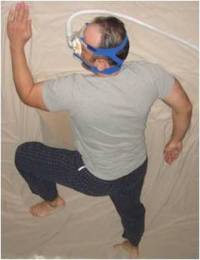
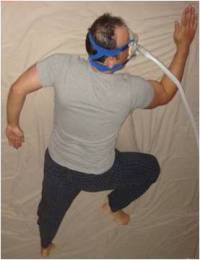
Images Source: www.uarsrelief.com/sleeppositions.html
Note: Some CPAP users sleep better in this position while using a simple pillow.
- For right sleeping position: The face should be on the upper-right edge of the pillow. The pillow should be angled at about 30 degrees, so the left edge of the pillow would be under the left shoulder and left torso.
- For the left sleeping position, you just have to make everything in the opposite way.
- To increase the comfort, use also a pillow under the right half of your chest and abdomen (if you sleep on the right), or under the left half of your chest and abdomen, if you sleep on the left position.
Do you need a CPAP pillow?
Well, if you don't have problems with CPAP mask leaks during the night and you feel good in the morning, then you don't need a pillow for CPAP.
However, many sleep apnea patients are not so lucky. It seems that using a CPAP mask on a standard pillow allows your head to tilt back, producing jaw joint that feels like an earache.
Using a specially designed CPAP pillow not only supports your head and neck, but it tilts it forward a bit, alleviating the pain while on CPAP.
If you are also a side sleeper, it's difficult to sleep with a CPAP mask on your face and with a standard pillow. On the other hand, the CPAP pillow doesn't interfere with the mask as most pillows do.
How to choose the best CPAP pillow?
There a couple of things to consider when you choose a CPAP sleep aid pillow:
- CPAP sleepers need a tall edge to keep the mask and hose out of contact with the mattress.
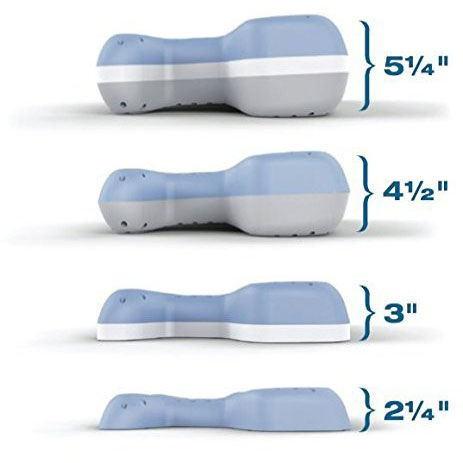
Keep in mind that a regular pillow viewed from its side shows the maximum loft in the center of the pillow, becoming flattered at the edges.
For most sleep apnea patients, the five-inch depth nicely fills the area between the shoulder and neck.
Furthermore, the CPAP Max Pillow can be adjusted to different depths, depending on your specific needs.
- The new pillow is too "hard" for you? Remember that the CPAP pillows tend to squish down and soften with use.
- in order to make the CPAP pillow more comfortable, you can fluff it up.
All you need to do is to place it between your hands, push against it a number of times, and you'll see the difference.
How To Make a CPAP Pillow?
One of the cheapest solutions that I have found to build a pillow for CPAP is to transform a simple pillow in a CPAP pillow. But how?
Take a look at this picture:
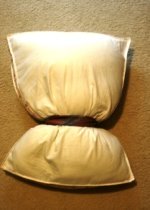
Using a simple pillow (maybe the one that you already use for sleep and a men's unused old tie, you can transform it into a new version of pillow for CPAP users.
It works well with a full face mask, sleeping on your tummy or on your side.
User guide: Put the pillow the long-way on the bed and the shorter end towards you. Lay your head so the CPAP mask should position in the notch parts.
Image Source: My Home-made CPAP-PillowYou can also make a pillow for CPAP using a cheap solid foam pillow.
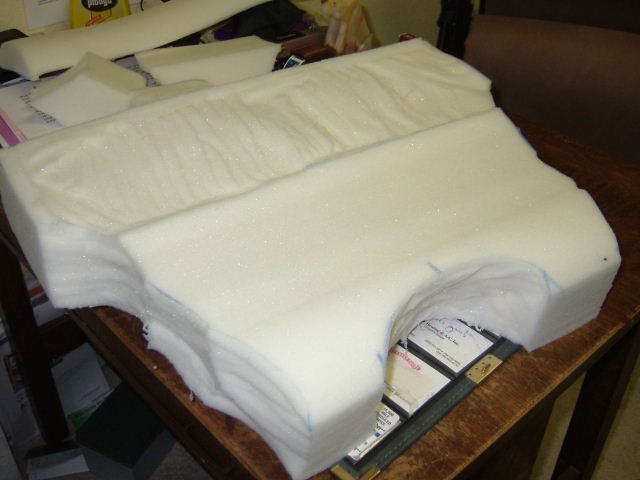
Just buy a cheap foam pillow, use a knife and cut off a big "C" on one side and an inverted "C" on the other. You will need another cut on the bottom side of the pillow, where your shoulder will be placed.
Side cutouts fit the mask, cutout in the middle fits onto your shoulder to hold it in place.
Now, place your head on the pillow and your mask should hang over the removed area.
Image Source: The Special Pillow for CPAP
Comfort vs Practicality
Some sleep apnea patients find uncomfortable these pillows for CPAP. Pillows are a very important component of success in CPAP treatment. You have to experiment until you find one that meets your needs.
Some patients have a whole collection of pillows right next to their collection of masks, right next to their collection of chin straps, next to their collection of dental devices, right next to their breathing machines...and so on.
Bottom line...One size does not fit all in the sleep apnea world, that is for sure!
Last Update: 22/07/2018
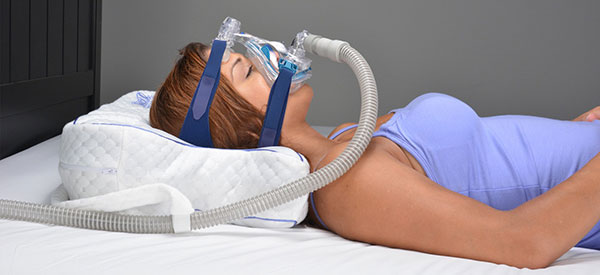








New! Comments
Have your say about what you just read! Leave me a comment in the box below.